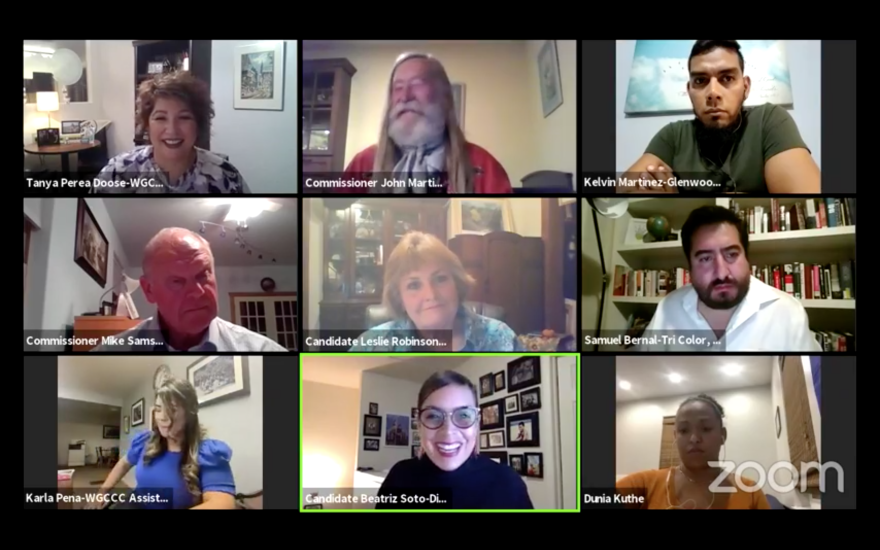With election day less than two weeks away, many in Colorado are looking to a growing group of Latino voters who could be a big part of deciding the outcome. According to the Pew Research Center, Latino voters are the largest non-white voting demographic this year, making up 16% of Colorado voters in 2018. And yet, Latinos have been historically underrepresented in political office in the Roaring Fork and Colorado River Valleys.
As of the 2010 Census, about 10% of Pitkin County and 30% of Eagle and Garfield counties are Latino, and this number has likely grown in the last ten years.
Garfield County resident, Jasmin Ramirez, says it’s past time for her elected officials to reflect that reality.
“You have to question why nobody on that leadership team for the county is Latino,” she said.
When the Grizzly Creek Fire sparked in Glenwood Canyon two months ago, Ramirez says she and her colleagues at the Latino-led nonprofit she works for had to ask the Garfield County Sheriff’s office to share evacuation orders in Spanish.
"If it's so hard for me as an autism parent, as a bilingual parent to advocate for my child in this setting, how much harder is it for the non-English speaking family?"
And the group made their own bilingual voter guide when they found out that only four counties in Colorado, including Denver, are required to send out a Spanish version of the official “blue book” in the mail. The bipartisan guide is used to help voters decipher complex and sometimes confusing ballot issues.
According to the 2010 Census, about 27% of Eagle and Garfield counties are non-English speakers. Ramirez says these numbers highlight the larger need to improve communications with the Spanish-speaking community in the valley and beyond.
And Ramirez says she saw the same kinds of problems at the school board level as well. That’s what prompted her to run last year and she became one of the first latinas to be elected to the Roaring Fork School District’s Education Board.
Ramirez says she didn’t consider running until she realized her son, who is on the autism spectrum, wasn’t getting adequate care at school.
“If it's so hard for me as an autism parent, as a bilingual parent to advocate for my child in this setting, how much harder is it for the non-English speaking family?,” she said.
Since joining the school board, Ramirez said she’s seen tangible changes in the way the district supports students with learning disabilities and non-English speaking families. But she says there’s still a long way to go. Not just at the schools, but across the county. And she’s watching the Garfield County Commissioner race closely with Democratic candidate Beatriz Soto.
“If she wins, my daughter will have the first Latina county commissioner in our county as a role model,” Ramirez said.
But the idea of “representation” is complicated. And Rifle resident Tanya Perea Doose considers it to be just one piece of the puzzle when it comes to her vote. She’s a 4th generation Coloradan and grew up in a conservative, Republican family.
“I will be the first to say I was very impressed with Beatriz,” Perea Doose said. “However, as Latinos and Hispanics, as a whole being part of a culture that is conservative, we value life, we value our freedom, we value our familias.”
Perea Doose can’t say how she’s voting this election because she’s the director of the non-partisan Western Garfield County Chamber of Commerce. But she says she’ll make her decision based on her values. In addition to her commitment to “life, freedom and family,” she also believes in a clear pathway to citizenship for DACA recipients and all immigrants, and a healthy business community.
“When I came into the chamber world, I was really surprised that we were not reaching out -- with such a strong Latino, Hispanic business presence -- that we were not reaching out in a way that supported them,” Perea Doose said
"Representation won't fix the problems, it's just one step in addressing the needs of the community."
As the chamber’s first Latina CEO, Perea Doose says she’s made outreach to the Latino and Hispanic communities a priority. Her initiatives include creating the chamber’s first Hispanic business council, providing a bilingual speaker at the chamber’s Rifle office, and making sure that visitor brochures are printed in Spanish and English.
Perea Doose says the chamber will continue to grow their work with Latino and Hispanic communities. And she expects her government to do the same.
“I'm an optimistic person by nature,” she said. “We're not going anywhere as Latinos and Hispanos and I think that we need to recognize that we do have a seat at the table. We just have to go to the right tables.”
Finding that “right table” is different for everyone. But as Denver University political science Professor Jesse Acevedo explains, it’s a crucial step in upholding democracy.
“A lot of research has shown that if there's some sort of what we call descriptive representation -- someone that's Latino, Latina, or LatinX, holding office -- then constituencies will have a greater interest, be more involved and have higher rates of turnout,” he said.
Acevedo says he teaches a class on political representation and he wants his students to understand that while representation is important, it’s not everything.
“Representation won't fix the problems, it's just one step in addressing the needs of the community,” he explained. “There has to be continued engagement and that's easier said than done.”
Both Jasmin Ramirez and Tanya Perea Doose know this to be true. Whatever happens this election, they say they’ll keep pushing for a more inclusive future.
Pueden encontrar la versión en español aqui.
Spanish translation of this story is made possible by a grant from the Google News Initiative’s Journalism Emergency Relief Fund.






